

{{'Newsletter' | t}}
Awards and Achievements
The University works extensively in promoting and expanding opportunities for students to engage in research activities to strengthen their research capability and gain hands-on experience. In this issue, we are proud to introduce some of the high-quality work and awards received by our research postgraduate students, whose achievements shine across multiple disciplines in the international arena and local community.
- Faculty of Architecture
-
New Study Explores Deep Learning’s Impact on Urban Land Use Mapping
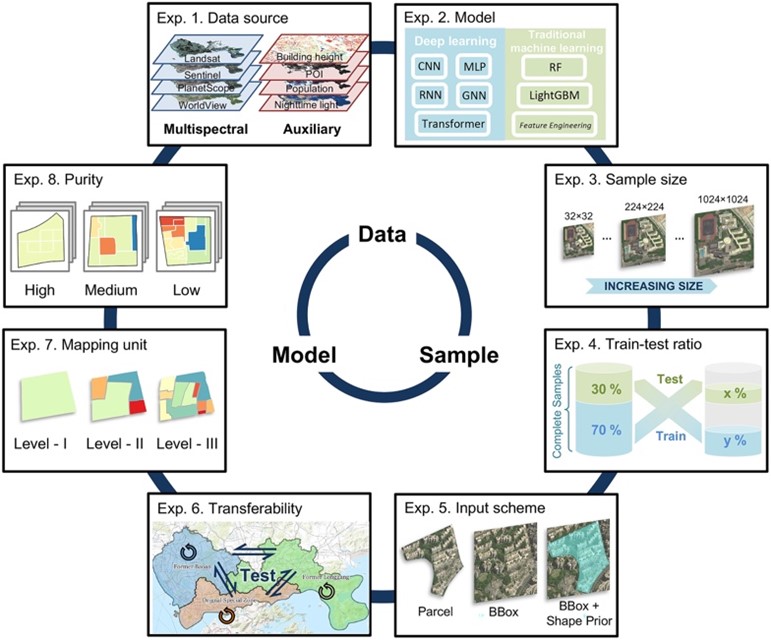
The eight comparative experiments conducted in the study.
A study led by PhD student Ziming Li, Assistant Professor Bin Chen, and Research Assistant Professor Shengbiao Wu from the Division of Landscape Architecture, Department of Architecture, has been published as a review paper titled “Deep Learning for Urban Land Use Category Classification: A Review and Experimental Assessment” in the journal Remote Sensing of Environment.
The paper comprehensively reviews the advances in deep learning-based urban land use mapping, a rapidly evolving field driven by the availability of large-scale geospatial data and cutting-edge artificial intelligence techniques. The study not only explores the current state of research but also provides an experimental assessment by conducting eight detailed experiments in Shenzhen, China. These experiments evaluate the impact of different data sources, classification units, and mapping approaches on the accuracy, efficiency, and automation of land use mapping.
This research highlights the potential of deep learning to enhance the scale and precision of urban land use mapping, offering new insights into overcoming the prevailing challenges in the field. By identifying key limitations and suggesting prospective directions, the paper serves as a valuable resource for researchers and practitioners aiming to leverage deep learning for urban land use analysis.
The paper can be accessed at https://doi.org/10.1016/j.rse.2024.114290.
PhD Student Explores Nantou Ancient Town’s Histories

Professor Tao Zhu and PhD Student Xi Liao’s focus on the influence of the construction of historical discourse and heritage protection strategies for the NAT Nantou Ancient Town.
Professor Tao Zhu and PhD Student Xi Liao of the Department of Architecture published a paper titled “Literary Gathering: The Discoveries and Inventions of the Nantou Ancient Town’s Histories” in the Journal of Architecture (建築學報) in July, 2024.
The Nantou Ancient Town (NAT) in Shenzhen is considered to be the birthplace of the cities in the Shenzhen-Hong Kong region, and its historical value has been increasingly appreciated in recent years. This paper is divided into three parts. First, it reviews the pioneering research studies on the NAT conducted by Shenzhen and Hong Kong historians in the early 1980s. It then summarises the historical evolution of the NAT from the Ming Dynasty to the 1990s. Finally, it focuses on the archaeological excavation outside the NAT’s South Gate in 2001, examining its declared discovery of the ‘Eastern-Jin Dynasty Moat Site’ and the controversy it caused. The paper attempts to combine academic and social analysis with historical and historiographical investigations. On the one hand, it examines how Shenzhen’s changing historical consciousness as the city develops profoundly influenced the construction of historical discourse and heritage protection strategies for the NAT. On the other hand, it examines how a group of historians used different research methods and made different academic judgements. The paper can be accessed at http://www.aj.org.cn/periodicaldetail-53822.aspx
Xi Liao has received research funding from two sources in 2024: the 14th Five-Year Plan Guangdong Philosophy and Social Sciences Youth Funding (廣東省哲學社會科學 “十四五 ”規劃青年基金) and the Innovation Fund for Industry, Academic and Research of Chinese Universities (中國高校產學研創新基金) .
Real Estate and Construction Team Wins First Prize in the 16th Innovation Competition in Construction Engineering and Management
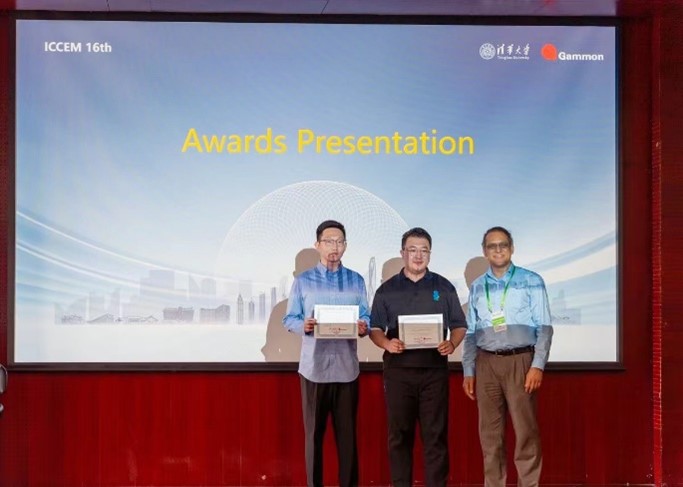
Zhe Chen (year-3 PhD candidate, middle) receiving the First Prize from Professor Mark Hastark (judge from Purdue University, right). Three PhD students—Zhe Chen, Dong Liang, and Lingming Kong—from the Department of Real Estate and Construction, supervised by Professor Frank Xue, won the First Prize from the 16th Innovation Competition in Construction Engineering and Management (ICCEM 2024) on 28 June 2024. The students’ supervisor, Professor Xue, also received the Outstanding Mentor Award at the same event. This renowned event, co-hosted by Tsinghua University in Beijing and Gammon Construction Ltd. in Hong Kong, is an annual international innovation competition in the civil engineering and construction management field. This year, 119 teams from 44 China and overseas universities signed up; only 12 teams were shortlisted for final interviews in Beijing.
The winning project, “4D-Point Cloud (4DPC) and Blockchain-enabled Lean Quality Management Platform for Prefabricated Products”, received the second highest score and the First Prize from the jury. The project aims to enhance the management efficiency and quality of prefabricated housing products, with implications for industry partners, China State Construction Hailong Technology Company Ltd. Leveraging the power of 4DPC and blockchain technologies, this PhD research-based innovation project streamlines the quality assurance process, automating it in real time by utilising new LiDAR sensing and AI processing technology. Labour and time costs are thus significantly reduced in the production of prefabricated construction and modular-integrated construction.
PhD Student Develops a Revolutionary App to Transform Urban Planning

James Njiraini Gachanja, a PhD candidate in the Department of Urban Planning and Design, received the HKU Research Postgraduate Student Innovation Award 2023/24 for his proposal on the Mtaa Wetu App. This web and mobile phone application addresses three critical challenges in urban planning and design: (1) data scarcity, limited accessibility, and data quality weaknesses including positional and completeness inaccuracy; (2) limited spatial information and analytics for evidence-based decision-making; and (3) inadequacies in public participation, interaction, and engagement for citizen-informed planning and budgeting.
The provision of spatial information based on reliable data is imperative for evidence-based decision-making. The project seeks to address the issue of data scarcity and information asymmetry that affects what people know and can discover about where they live, and which hinders effective urban planning and decision-making. It is now being implemented in Kenya, where access to spatial data was identified to be an issue. A pilot WebApp has been developed and social media activation, public engagement, and networking are ongoing.
Click here to learn more about Mtaa Wetu App.
- Faculty of Dentistry
-
Interdisciplinary Research Team Wins Second Prize in the HKU Student Innovation and Entrepreneurship Competition
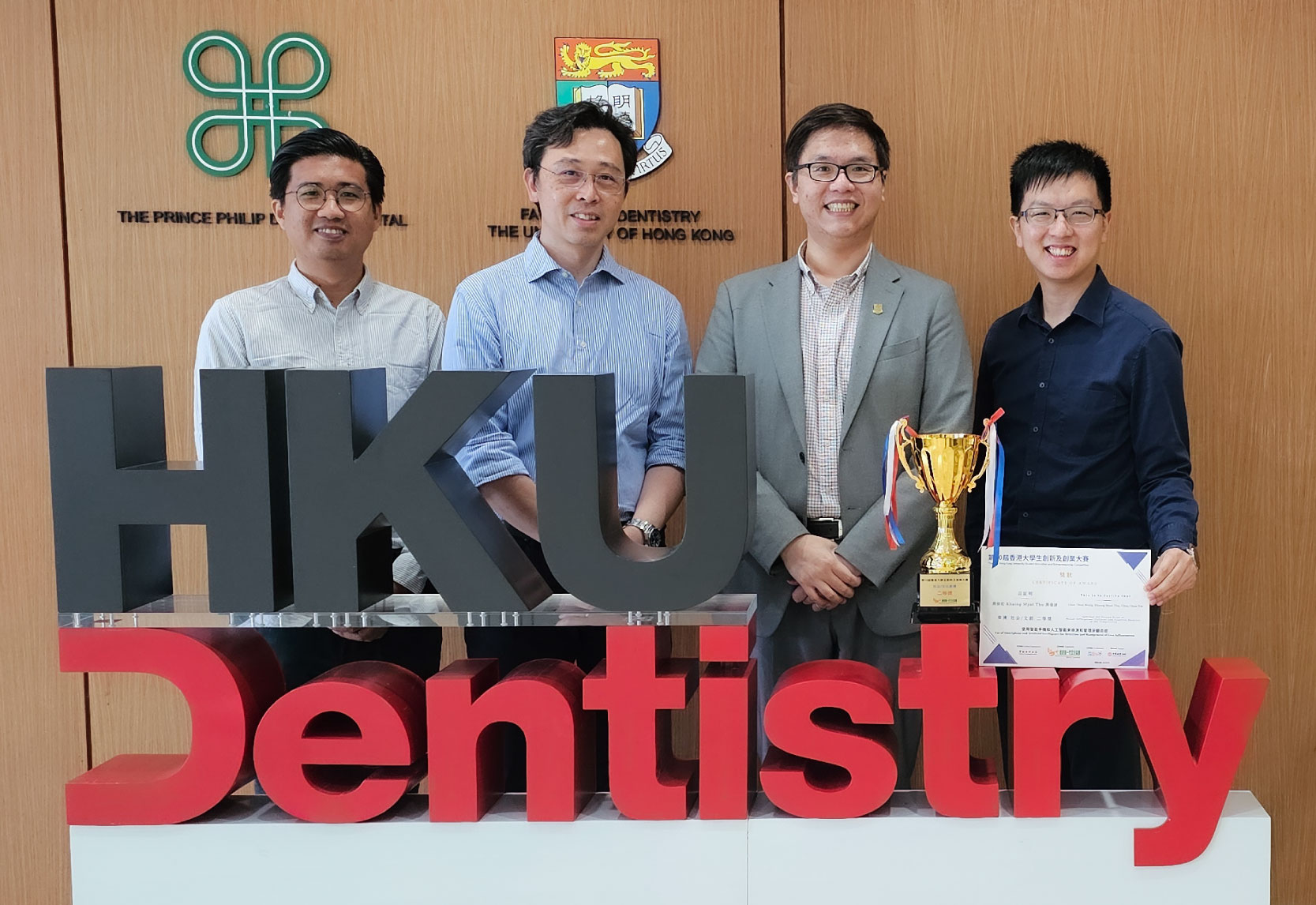
From left: Dr Khaing Myat Thu, Professor Richard Hsung, Professor Walter Lam, and Dr Reinhard Chau A project team comprising PhD student Dr Reinhard Chau and Dr Khaing Myat Thu from HKU’s Faculty of Dentistry, Professor Walter Lam from the HKU Musketeers Foundation Institute of Data Science, Mr Nelson Chau from Dentomi Limited, and Professor Richard Hsung from the Hong Kong Chu Hai College has won the Second Prize in the Social Enterprise/Cultural & Creative Service Category in the 10th Hong Kong University Student Innovation and Entrepreneurship Competition. The Competition was organised by the Hong Kong New Generation Cultural Association and co-organised by the Hong Kong Science and Technology Parks, with support from the Innovation and Technology Commission.
The wining AI project, “Use of Smartphone and Artificial Intelligence for Detection Management of Gum Inflammation” utilises mobile devices to provide a cost-effective preliminary screening solution for gum inflammation. It aims to alleviate the burden on government healthcare systems and enhance primary healthcare services. The initiative also empowers non-governmental organisations to promote oral health in communities with limited access to dental services.
(This article is adapted from https://facdent.hku.hk/bulletin/202407/award.php)
Dentistry Student Awarded Talent Development Scholarship
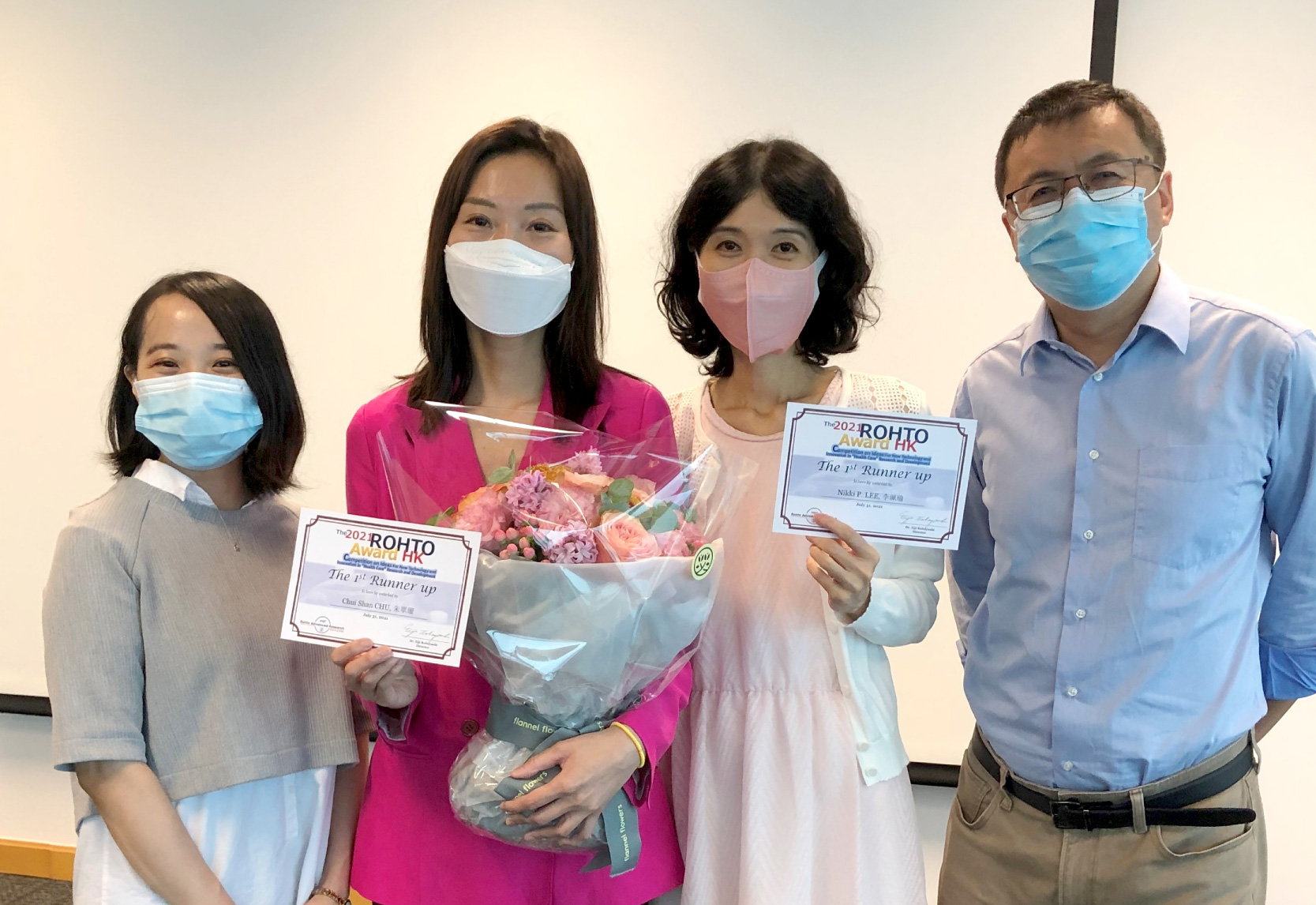
Ms Chui Shan Chu (second left), Dr Nikki Lee (second right), and Professor Liwu Zheng (right) celebrate winning the ROTHO Award. Chui Shan Chu, a PhD student in the Faculty of Dentistry, has been awarded the Talent Development Scholarship by the HKSAR Government in recognition of her outstanding achievements in innovation, science, and technology.
Shan Chu’s recognition stems from her winning first runner-up in the 2021 ROHTO Award HK alongside Dr Nikki Lee from HKU’s Department of Surgery. During the competition, they impressed the judges with innovative ideas from the research project: “Digital Healthcare Technology for Precision Oncology: Development of Artificial Intelligence (AI)-Driven Clinical Models to Predict Prognosis and Select Treatments for Pan-cancer Applications”, as they effectively conveyed the practical application and potential impact of their research ideas in the real world. Their project exemplifies the transformative power of digital healthcare technology in the field of precision oncology.
“I would especially like to express my gratitude to Professor Liwu Zheng for his support,” Shan Chu said. “Over the years, he has given me the flexibility to advance my research project.”
- Faculty of Education
-
Rethinking Digital Reading: New Research at HKU Questions the Role of Technology in Reading in the Digital Age
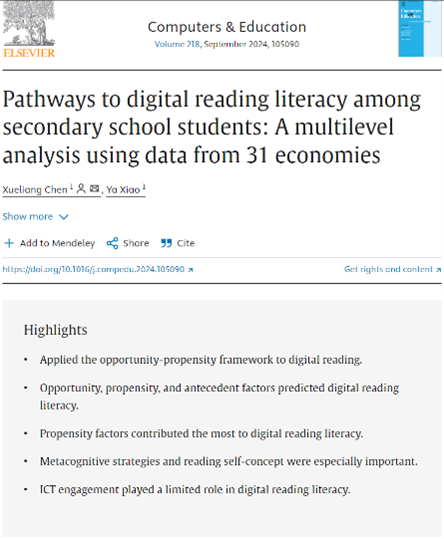
Xueliang Chen and his co-author Ya Xiao, both PhD candidates from the Faculty of Education, have recently published their study in the highly influential journal Computers & Education. The paper, titled “Pathways to digital reading literacy among secondary school students: A multilevel analysis using data from 31 economies”, investigates the role and relative contributions of opportunity, propensity, and antecedent factors in adolescents’ digital reading performance.
Using an internationally representative dataset of 211,899 15-year-old students from 31 economies and grounded within the opportunity-propensity framework, this study explores various factors associated with digital reading performance, such as teacher technology availability and school technology support, student reading motivation, metacognitive reading strategies, and ICT engagement, among others. It also compares the relative contributions of these factors. The study is distinguished by its extensive scope, rigorous methodology, and robust theoretical foundations.
The study affirms the importance of considering readers’ external environments and internal attributes, while highlighting the significant role of students’ awareness of metacognitive strategies. It also questions the much-hyped role of technology, demonstrating that technology-related factors, such as ICT engagement, contribute minimally to students’ digital reading performance. These findings not only have significant implications for reconciling disparate results in digital reading research but also indicate areas where instructional design should refocus its efforts.
The paper can be accessed at https://doi.org/10.1016/j.compedu.2024.105090.
PhD Student Presents Paper at the AAAL Conference
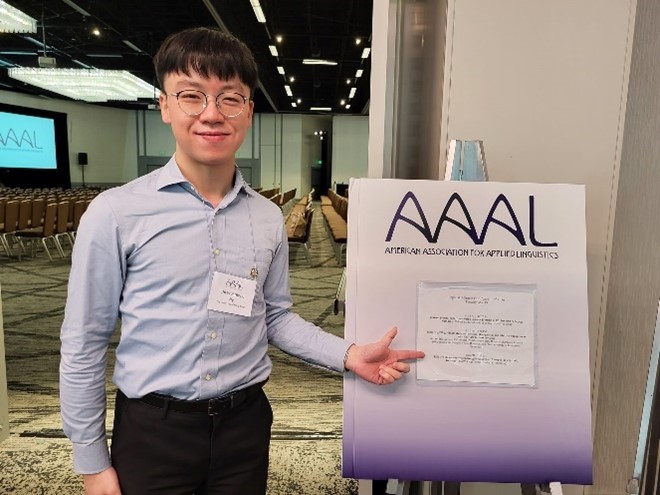
Chi Wui Ng attending the AAAL Conference 2024 in Houston, Texas in March 2024. Chi Wui Ng, a PhD student from the Faculty of Education, attended the American Association for Applied Linguistics (AAAL) Conference 2024 held in March in Houston, Texas. This annual conference of the AAAL attracts diverse presenters both nationally and internationally to share innovative research and engage in comprehensive and stimulating discussions. It also offers plenary presentations and book exhibits. At the conference, Chi Wui had the opportunity to present his paper and also to acquire the latest knowledge in the field of applied linguistics.
“Throughout the conference, it was not surprising to see that research on artificial intelligence in applied linguistics has been booming,” Chi Wui said. “While various AI tools, such as online translators, grammar checkers, automated scoring, and language modelling, possess the potential to aid teaching and learning, educators remain concerned about issues of plagiarism and information fabrication when using generative AI chatbots, especially in high-stakes assessments.” “Another significant takeaway from the conference is the imperative need to preserve minority and indigenous languages in this plurilingual world. Not only do those languages represent ancestral funds of knowledge, but they also serve as sites of cultural memory.”
- Faculty of Engineering
-
Study on Directional Liquid Transport Inspires Breakthroughs in Fluid Dynamics Technology
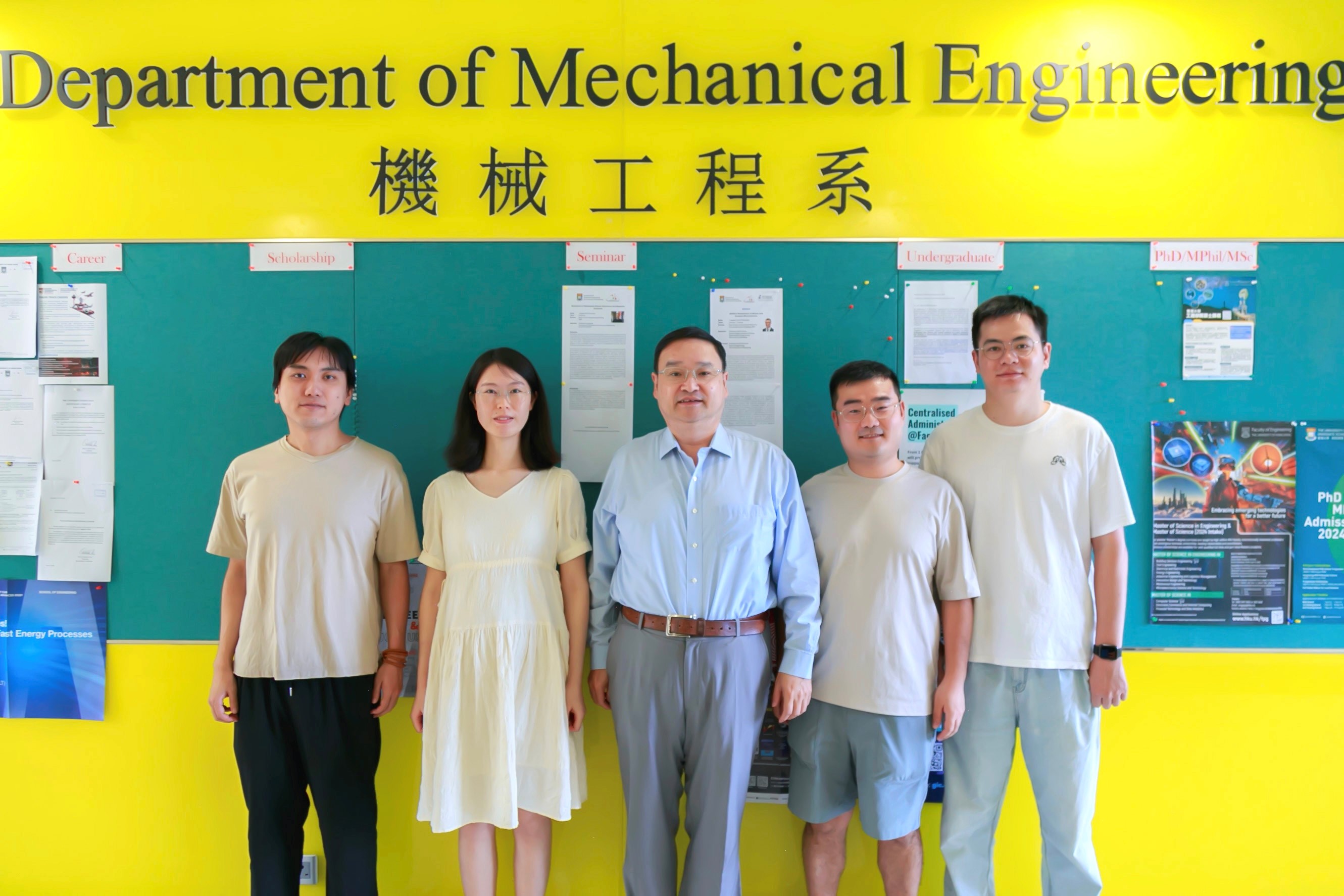
(From left) Hengjia Zhu, Ling Yang, Professor Xiaobo Yin, Dr Wei Li, and Qiyu Deng.
A team from the Department of Mechanical Engineering of HKU has recently published a paper titled “Selective directional liquid transport on shoot surfaces of Crassula muscosa” in Science on June 20, 2024. PhD candidate Ling Yang and Dr Wei Li are co-first authors, and Professor Xiaobo Yin, Professor Liqiu Wang (The Hong Kong Polytechnic University), and Dr Jiaqian Li (Shandong University) are corresponding authors.
Directional liquid transport plays a crucial role in numerous applications including microfluidics, water harvesting, oil-water separation, solar desalination, and heat transfer. This property has been observed in various species such as cacti, spiders, lizards, the pitcher plant Nepenthes alata, and Araucaria leaves. Past research believed that a specific liquid can only be transported in a fixed direction on species with specific liquid communication properties and cannot switch the transport direction. Recently, the HKU researchers have shown that a succulent plant, indigenous to South Africa, manipulates liquid flow in a previously unknown way—it can transport liquid unidirectionally in selective directions. This could inspire breakthroughs in a range of technologies in fluid dynamics and nature-inspired materials.
The paper can be accessed at https://www.science.org/doi/10.1126/science.adk4180.
Engineering Research Fills the Gap in Lower Limb EMG Signals

Thigh sEMG data performance testing.
Jiahao Sun, a year-1 PhD student from the Department of Electrical and Electronic Engineering, has recently published a paper in IEEE Transactions on Neural Systems and Rehabilitation Engineering on electromyographic (EMG) signals that he co-authored with other team members from the Department of Mechanical Engineering.
EMG signals have gained popularity for controlling prostheses and exoskeletons, particularly in the field of upper limbs for stroke patients. However, there is a lack of research on the lower limb area, and standardised open-source datasets of lower limb EMG signals, especially recording data of Asian race features, are scarce. Additionally, deep learning algorithms are rarely used for human motion intention recognition based on EMG, especially in the lower limb area. In response to these gaps, the research team presents an open-source benchmark dataset of lower limb EMG with Asian race characteristics and large data volume, the JJ dataset, which includes approximately 13,350 clean EMG segments of 10 gait phases from 15 people. This is the first dataset of its kind to include the nine main muscles of human gait when walking. The experiments demonstrate that the adjusted ResNet can achieve significant classification accuracy, with an average accuracy rate of 95.34% for human gait phases. The research provides a valuable resource for future studies in this area and demonstrates the potential for ResNet as a robust and effective method for lower limb human motion intention pattern recognition.
The paper can be accessed at https://ieeexplore.ieee.org/document/10535982.
- Faculty of Law
-
PhD Student Wins Prizes with Papers on Public Interest Litigation

Ziying Liang (first from right) receiving Third Prize at the 2024 Guangdong-Hong Kong-Macao Greater Bay Area Rule of Law Forum.
Ziying Liang, a PhD student of the Faculty of Law, won Second Prize at the Annual Meeting of the China Ecological Civilization Research and Promotion Association with her paper titled “An Empirical Study on Wild Animal Conservation under the Threshold of the Criminal Incidental Civil Public Interest Litigation in the PRC”. Ziying was also awarded Third Prize at the 2024 Guangdong-Hong Kong-Macao Greater Bay Area Rule of Law Forum with her paper titled “Restorative Compensation Mechanism for Criminal Incidental Civil Public Interest Litigation Relating to Marine Ecology in the Greater Bay Area of Mainland China—A Sample of First-instance Judgements on Marine Ecological Offences”. Ziying presented this paper at the conference in August 2024, and it will be published in the Chinese peer-reviewed journal Nomocracy Forum in April 2025.
“I have to say that pursuing a career as a PhD is really a challenging mission, and it does indeed require great determination and preservation,” Ziying shared. “I would like to extend my heartfelt appreciation to my supervisor, Professor Amanda Whitfort, for her continuous support and warm encouragement throughout my journey of self-surpassing. Additionally, I wish to express my thanks to my co-supervisor, Professor Richard Cullen, who contributed many insightful ideas to our discussions, as well as Professor Simon Young, who generously provided me with advice and encouragement in my academic life. I am also profoundly grateful to my family and close friends for their companionship and understanding along the path I have chosen.”
- Faculty of Science
-
Research on FANCM Provides a New Strategy to Overcome Cancer Drug Resistance
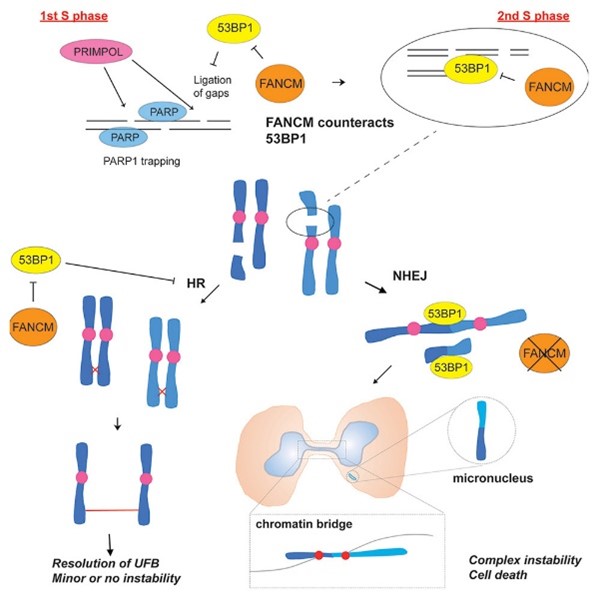
Zeyuan Liu—a PhD student from the School of Biological Sciences under supervision of Professor Gary Ying Wai Chan—has recently published a research article as the first author titled “FANCM promotes PARP inhibitor resistance by minimizing ssDNA gap formation and counteracting resection inhibition”. Zeyuan discovered that FANCM helps to repair DNA damage caused by the PARP inhibitors, a type of cancer drugs commonly used in treating breast and ovarian cancers. In the absence of FANCM, DNA damage increases, leading to cell death. However, when FANCM is present, it prevents the formation of DNA damage by promoting the repair of collapsed DNA replication structures, aiding the survival of cancer cells. These findings are significant as they help to explain why some cancers may become resistant to PARP inhibitors. By understanding the role of FANCM in drug resistance, it may be possible to develop more effective treatment strategies against cancers, particularly those that are currently resistant to PARP inhibitors.
The study suggested that inhibiting FANCM could potentially enhance the effectiveness of PARP inhibitors, providing a new strategy to overcome drug resistance. This could significantly broaden the application of PARP inhibitors in treating a wider range of cancers.
The paper can be accessed at https://www.cell.com/cell-reports/fulltext/S2211-1247(24)00793-9.
PhD Candidate Mapped the First Global Biogeographic Regions for an Insect Group
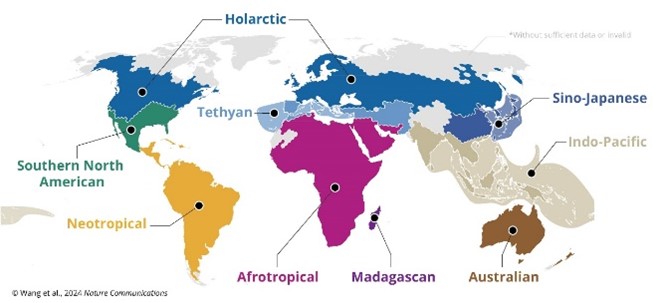
Global biogeographic realms of ants.
Runxi Wang, a PhD candidate from the School of Biological Sciences, his supervisor Professor Benoit Guénard, and other collaborators have put the first insect group on a century-old map of biodiversity. The map, illustrating biogeographic regions, is one of the most fundamental descriptions of the natural world and critical for global conservation planning. It has been updated several times but never included insects, which represent the majority of species on Earth (e.g., 1.1 million insect species vs. ~30,000 for tetrapods). The international team has successfully produced such a map for a major insect group—ants—based on the distribution and evolutionary relationships of ~16,000 species. Their findings have been published recently in Nature Communications.
This map shows the division of the global territory of ants into 9 large biogeographic realms for the first time and reveals complex relationships with the pattern observed in vertebrates and plants. Interestingly, while the biogeographic regions are overall similar among different taxa, plants shown more similarity with ants than with any vertebrate groups. “These results not only indicate the tight links between ants and plants, but also suggest that the pattern of vertebrates failed to capture these essential links,” Runxi said. “We need further efforts to include more insect groups into the global picture of biodiversity.”
The paper can be accessed at https://www.nature.com/articles/s41467-024-49918-2.
- Faculty of Social Sciences
-
Crossdisciplinarity Research Students Win the Innovation Award in the 2nd City I&T Grand Challenge
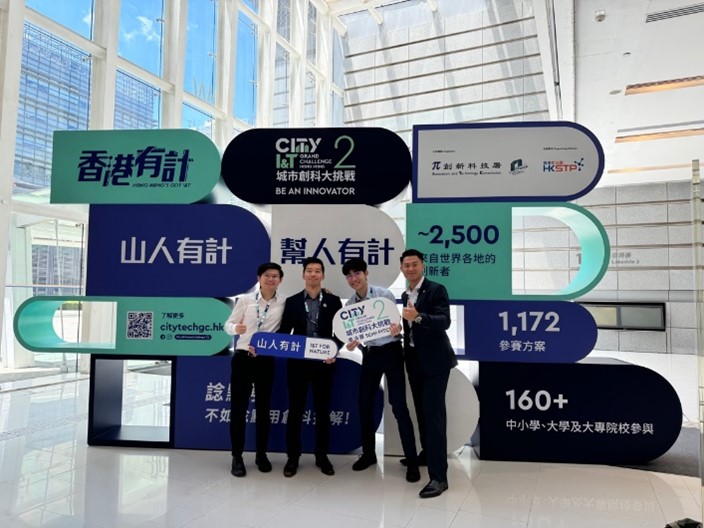
(From left) David Ho Cheung Ho, Jeffrey Man Hei Chang, Tommy Sung Ho Cheuk, and Ho Yin Wong winning the Innovation Award in the 2nd City I&T Grand Challenge Under the guidance of Professor Nicky Y.F. Lam and Professor Benjamin L. Iaquinto from the Department of Geography, postgraduate students Tommy Sung Ho Cheuk (MPhil), Jeffrey Man Hei Chang (PhD), and David Ho Cheung Ho (MPhil) won the Innovation Award (University/Tertiary Institute Group) in the 2nd City I&T Grand Challenge organized by the Hong Kong Science and Technology Parks Corporation and HKSAR government. Ho Yin Wong, a PhD candidate from the Department of Building Environment and Energy Engineering at The Hong Kong Polytechnic University, was also part of the team, and together they received a trophy and a HK$30,000 cash award.
The team integrated research experiences from urban climate resilience, geographic information system, tourism studies, and AI fire safety engineering into a practical proposal for providing a safer hiking experience for Hong Kong citizens. The team will also have the chance to receive up to HK$1,000,000 in seed funding to develop their solutions for trial and adoption with the HKSARG Agriculture, Fisheries and Conservation Department and other government officials.
For more information about the project, please refer to https://www.citytechgc.hk/en/innovation-gallery/u-001109/.
Advancements in User-Centric Co-Creation for Intelligent Soft Wearable Robotics

PhD student Clio Yuen Man Cheng, from the Department of Social Work and Social Administration, together with her supervisor, Professor Vivian W.Q. Lou, and Professor Ning Xi, from Department of Industrial and Manufacturing Systems Engineering, have been awarded the Best Paper Award at the 15th International Conference on Applied Human Factors and Ergonomics 2024. The paper is titled “Advancing the Development of Intelligent Wearable Robots for Elderly Assistance: An Innovative User-Centric Co-Creation (UC3) Framework”.
Another paper by Clio and Professor Lou titled “Recruiting Older Participants: Evaluating the Role of Message Framing in Willingness to Enroll in Wearable Robot Experiments” published in Cogent Social Sciences also contributes to understanding the persuasive effects of message framing on older adults’ willingness to enrol in wearable robot experiments, ultimately fostering advancements in the field and engaging older participants in cutting-edge research endeavours.
The research on developing soft wearable robots in an innovative ‘User-Centric Co-Creation’ approach is a transdisciplinary collaboration under a project called “i-REACH” (https://i-reach.hku.hk/) funded by the Research Grants Council through a Theme-based Research Scheme project [#T42-717/20-R].
Sociology Student Examines the Politics of Higher Education in China

Xinqu Zhang, a PhD student from the Department of Sociology, and his supervisor Professor Peng Wang have recently published an article titled “The politics of higher education in China: the signal– response mechanism, downward tiered pressure escalation, and the Double First-Class University Initiative”. The publication has accepted by a Tier 1 SSCI journal, Comparative Education.
This article examines the politics of higher education in China, drawing on empirical data collected from three elite universities listed in the ‘Double First-Class University Initiative’. The researchers investigate how a ‘signal–response’ mechanism, in which the country’s top leaders signal broad policy goals and subordinate officials respond, works in China’s higher education arena. To address the uncertainties caused by vague signals and avoid blame for failure to fulfil policy goals, a strategy involving a gradual downward increase of implementation pressure within the bureaucratic hierarchy, termed cengceng jiama (層層加碼), has been adopted. Universities and their faculties/departments now establish their own ‘up-or-leave’ systems to remove underperforming researchers, apply more stringent criteria when assessing faculty members’ publication rates, and discriminate against domestically trained PhDs when hiring. Consequently, faculty members, especially those in the younger generation, often experience high levels of anxiety, insecurity and inequality, which can hinder their development as scholars. The data of this study was collected and analysed through a qualitative approach.
The paper can be accessed at https://doi.org/10.1080/03050068.2024.2376986.
Exploring Working Time Mismatch and Employee Subjective Well-being across Institutional Contexts

Wanying Ling, a PhD student in the Department of Sociology at HKU, together with her co-authors Senhu Wang from the National University of Singapore and Zhuofei Lu from the University of Oxford, have recently published a study in Work, Employment and Society, the leading journal in the sociology of work. The paper, titled “Working Time Mismatch and Employee Subjective Well-being across Institutional Contexts: A Job Quality Perspective,” investigates the adverse effects of working time mismatch—situations where employees either work more or fewer hours than they desire—on their subjective well-being.
By utilising panel data from the UK and cross-country data from Europe, the research underscores the crucial role of job quality in mediating these effects. The findings reveal that low job quality, particularly poor career prospects, significantly impacts the well-being of underemployed individuals, accounting for more than half of the negative effect. For overemployed individuals, low job quality—characterised by poor career prospects, a poor social environment, and an imbalance between work and life—explains over a third of the negative impact. The findings suggest that the design of such interventions may need to consider the institutional context of different countries, as the patterns of job quality and their relationship to employee well-being vary across different institutional regimes. These insights also emphasise the necessity for policies and practices aimed at enhancing job quality to improve employee well-being, especially in environments where working time mismatches are common.
The paper can be accessed at https://doi.org/10.1177/09500170241259330.
